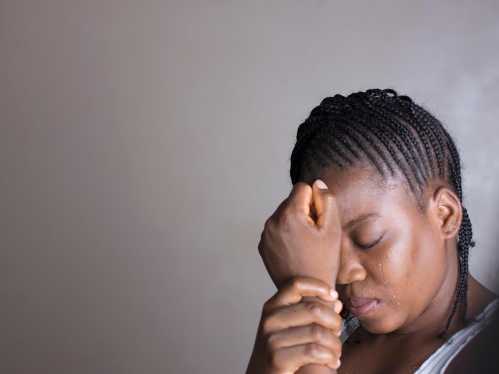
Addressing Interpersonal Violence at Rutgers University
Offices for Violence Prevention and Victim Assistance
The Office for Violence Prevention and Victim Assistance is committed to creating a community free from violence. The Offices on each campus provide services designed to raise awareness of and respond to the impact of interpersonal violence and other crimes. Through a combination of direct service, education, training, policy development, and consulting to the University and broader community, the offices serve as a critical voice in changing prevailing beliefs and attitudes about violence.
The Offices for Violence Prevention and Victim Assistance (VPVA) are partially funded by the Enhancing Victim Services Grant through the Attorney General's Office (AG-VOCA).
The following pages offer guidance and resources on the Rutgers University path toward addressing and ultimately ending, interpersonal violence. As part of the Enhancing Victim Services Project, the Center for Research on Ending Violence works closely with campus partners to create a series of Technical Assistance Documents covering best practices, the latest in research and innovative programs and other topics.
Follow the link to learn more about the "Enhancing Victim Services Project" funded by the Office of the New Jersey Attorney General through a Victim of Crimes Act Grant

Intersectional Bystander Intervention and Minoritized Identities
The Center for Research on Ending Violence (REV) at the Rutgers University School of Social Work has been conducting an extensive evaluation of the services and programs implemented as part of the VOCA-funded project (titled Enhancing Victim Services) to assess their impact on student knowledge.
The purpose of this evaluation is to gather the thoughts, experiences, and priorities of racialized, queer, and/or gender nonconforming students when it comes to minimizing violence, harm, and oppression through bystander intervention programming across Rutgers University campuses using a participatory research method known as concept mapping. Findings presented in this report are the result of close partnership between The REV Center, the VPVAs, and campus cultural and LGBT centers in an effort to understand the needs of minoritized students and how to best tailor programming. This project is one of many efforts to enhance awareness of, and access to, programs and services and to evaluate programming implemented as part of the VOCA-funded project.



We R Here
Rutgers is committed to ending sexual violence, dating/domestic violence, and stalking on campus. The We R Here campaign is the response to campus violence that impacts our community by letting students know We R Here to provide resources on each campus and work towards greater involvement from students in ending this violence and supporting survivors.
The We R Here initiative is supported through the “Enhancing Victim Services throughout Rutgers University” grant. Learn more about the Enhancing Victims Services Project here.
This page is dedicated to providing you with information about resources on campus and in the community. Read more about what Dr. Sarah McMahon says about the importance of the We R Here campaign.
If you are concerned about your immediate safety, please call 911 or go to the hospital emergency room in your area.
Connect to Help
If you have experienced sexual assault, dating violence, or stalking, it is natural to feel overwhelmed or have concerns. There are options available for you to get through this moment. We believe that it is important for you to make the decision that is right for you.
You have an option to speak to resources that are confidential or non-confidential. Confidential sources, like VPVA and health services, are not required to report the information that you share. Non-confidential sources, however, such as faculty and Title IX Coordinators, must report these incidents. For more information on confidentiality and privacy, visit Title IX.
Below is a general guide of options and next steps you can take following an incident of sexual or dating violence. For specific contact information for the resources on your campus, select your campus below.
Accordion Content
-
Support is available to you at the Offices for Violence Prevention and Victim Assistance (VPVA). There is a VPVA located at every Rutgers campus, including RBHS, to provide guidance to victims/survivors both for immediate and continuing care. These offices have trained advocates who serve to solely support the student’s needs. The VPVA staff are available for emotional support as well as accessing other resources like counseling, medical attention, and other accommodations. These emergency accommodations can include relocation, transportation, work and academic changes. They can explain and accompany you to file a report with the university or police.
-
Health services on campus can provide medical attention that includes testing for STIs or pregnancy, assessing the need for preventative medication, and examination for any injuries or trauma.
If you are interested in evidence collection from an examination, the local hospital has forensic nurse examiners that can preserve evidence in case you may be interested in reporting the incident.
-
Health services on campus can provide medical attention that includes testing for STIs or pregnancy, assessing the need for preventative medication, and examination for any injuries or trauma.
If you are interested in evidence collection from an examination, the local hospital has forensic nurse examiners that can preserve evidence in case you may be interested in reporting the incident.
-
Students have the option to access services on campus but can make the decision to seek assistance in the community outside of Rutgers University. In each county in New Jersey, there are sexual violence programs and domestic violence programs that offer an array of services. These services can include a 24-hour hotline, counseling, referrals, and accompaniments to legal proceedings. For statewide information, visit the New Jersey Coalition Against Sexual Assault or the New Jersey Coalition to End Domestic Violence.
-
There are ways that the university can assist you in providing additional support or protection following an incident. Both Title IX and VPVA can discuss accommodations that are necessary to increase your sense of well-being. Some examples of these measures include security escort, changes in on-campus work or class schedules, assignment extensions, transportation, and emergency housing.
Connecting to these resources on your campus
Newark
VPVA
Blumenthal Hall, Room 203
973 353-1918Title IX
Coordinator: Scott Strother
Paul Robeson Campus Center, Room 316B
973-353-1906Health Services
973-353-5231RUPD
Dial 911 for emergency or call 973-353-5111Local DV/SV Programs
Sexual Violence: SAVE of Essex County
973-353-5111Domestic Violence: Rachel Coalition
973-740-1233New Brunswick
VPVA
3 Bartlett Street, College Ave Campus
848-932-1181Title IX
Coordinator Jackie Moran
Bishop House, Room 206
848-932-8200Health Services
848-932-7402RUPD
Dial 911 for emergency or call 732-932-7211Local DV/SV Programs
Sexual Violence: Center for Empowerment
(732) 321-1189Domestic Violence: Women Aware
732-249-4504
Camden
VPVA
Campus Center, 3rd Floor
856-225-2326Title IX
Coordinator Allison Wisniewski
Campus Center, 326 Penn Street
856-225-6422Health Services
856-225-6005RUPD
Dial 911 for emergency or call 856-225-6111Local DV/SV Programs
Sexual Violence: SERV
1-866-295-SERV (7378)
Domestic Violence: Camden County Women’s Center
856-227-1234RBHS
Services scheduled based on your location
973-972-4636Title IX
If you have questions about Title IX at RBHS, contact Susan Hamilton
Assistant Vice Chancellor of Academic and Student Affairs
973-972-5374 or susan.hamilton@rutgers.edu
Rutgers University Sexual Violence PSA 2018
RU School of Social Work Graduate Student PSA
Supporting Survivors of Interpersonal Violence
During the 2017-18 academic year a federal Victims of Crime Act grant was awarded to Rutgers University through the NJ Office of the Attorney General to increase support for victims/survivors of sexual violence, dating violence, and stalking on campus. The “Enhancing Victim Services throughout Rutgers University” project is housed at the Center for Research on Ending Violence (REV) at the Rutgers School of Social Work.
Dr. Sarah McMahon, Associate Professor and Director of The REV Center serves as the principal investigator for the grant. The project is currently funded through August 2023 and continues to work alongside a designated advisory board to support the needs of each campus and serve survivors.
The grant continues to be a collaboration between REV and members of the Camden, New Brunswick, Newark, and RBHS campuses that addresses sexual and dating violence. These members include representatives from Student Affairs, Title IX Coordinators, and the Offices for Violence Prevention and Victim Assistance.The main project goals are the expand direct services for victims/survivors on Newark, New Brunswick, Camden, and RBHS campuses; train students and staff to connect victims to services; engage the university in addressing violence on campus; and strengthen the coordinated, university-wide approach to sexual and dating violence. Funding provided by this grant allows for an Office for Violence Prevention and Victim Assistance (VPVA) to exist on all of the Rutgers campuses, extending support and information to students throughout the Rutgers community.
This continued collaboration will focus on the following on several objectives. One such objective being, the sustained efforts of the VPVA offices on each campus in addition to targeted outreach to specific populations. The grant will also focus on connected with faculty and stuff to ensure their awareness of resources as well. The grant has allowed campuses to expand outreach to victims of other types of crime on campus. In an effort to do this, each campus hired a graduate assistant dedicated to researching best practices, programming and awareness raising activities around addressing issues of all types of violence on campus. The grant is working to encorporate an intersectional, anti-racist lens with an expanded focus of this work to include providing technical assistance throughout the state to help build capacity to address sexual and dating violence in higher education and high school.
In addition, The REV Center continues to develop university-wide messaging through various collaborations such as participation in National Crime Victims’ Rights Week, creating various PSA's, and working toward a centralized website highlighting the resources that exist on campus for victim/survivors. The Center for Research on Ending Violence is providing technical assistance to each of the campuses to strengthen their response, ensuring compliance with state and federal grant reporting, and supplying evaluation to the grant activities to determine the effectiveness and impact of the campus efforts.
PSA
New Jersey Statewide Conference on Campus Sexual Violence
- See below for more information
Annual Reports


New Jersey Conference on Campus Sexual Violence
Thank you to everyone who attended the 2019 Conference on Campus Sexual Violence!
We were thrilled with the amount of support we received and the great ideas gathered
For additional resources associated with Campus Sexual Violence please follow this link.
We were pleased to have an incredible turnout at the conference with partners from within Rutgers, other institutions of higher education, non-profit organizations and service providers, state officials, and secondary schools. The conference provided space for an important exchange of ideas and resources, as well as developing paths for collaboration. It was clear from the day’s events and conversations that there is a strong commitment to building safe and inclusive campus environments across our state.
Sarah McMahon
Center Director
University Wide Faculty and Staff Training
Enhancing Victim Services Throughout Rutgers: Bystander Intervention Training for Faculty and Staff
The Rutgers University Model for Addressing and Preventing Sexual Violence, Dating Violence, Sexual Harassment and Stalking on Campus is based on implementing best practices and evidence-informed methods of service provision and prevention programming including bystander intervention training for faculty and staff.
If you wish to schedule any of the following workshops and/or discuss a tailored module for your staff, please email Simone Snyder at sms694@ssw.rutgers.edu
All workshops are funded by a Victim’s of Crime (VOCA) grant from the Office of the New Jersey Attorney General, and are part of the ‘Enhancing Victim Services Throughout Rutgers University’ project V-84-20.
Accordion Content
-
This interactive, trauma-informed workshop provides faculty and staff an overview of how to address interpersonal violence (sexual violence, dating violence, sexual misconduct and stalking) and understand their role in creating a campus-wide culture of accountability, safety and respect. Bystander intervention strategies are utilized to provide faculty and staff with the skills to: effectively identify and respond to interpersonal violence experienced by colleagues and students, understand Rutgers’ anti-violence policies and procedures, including incident reporting and supportive resources, and utilize trauma-informed action steps to assist impacted colleagues and students. Developed through an intersectional lens, the workshop will also explore how racism, systemic oppression and resource disparities impact survivor experiences.
-
What are microaggressions and how do they impact staff, faculty and student experiences at Rutgers? How do they relate to interpersonal violence? This training explores how these daily verbal, behavioral or environmental indignities, whether intentional or unintentional, perpetuate negative stereotypes and cause harm. Participants will gain bystander intervention skills to identify and interrupt microaggressions, explore ways to ‘call-in’ students and colleagues and utilize microaffirmations to foster a safer and more inclusive community. This workshop was developed using an intersectional lens and seeks to amplify and prioritize voices of BIPOC, LGBTQ+ and other marginalized staff and faculty, who are disproportionately impacted by implicit bias and microaggressions.
-
This workshop defines sexual and gender-based harassment and their link to the continuum of sexual violence. It includes concrete bystander intervention strategies to interrupt sexual harassment in the workplace, using real scenarios and interactive activities. The workshop also covers Rutgers’ sexual misconduct policies, reporting procedures and trauma-informed action steps to support impacted colleagues and students. An in-depth overview of Rutgers resources will be provided.
-
A Workshop for RBHS Faculty and Staff
This workshop draws on current research to explore the unique risk factors for sexual and gender-based harassment in medical fields. It includes concrete bystander intervention strategies to interrupt sexual harassment in the workplace, using real scenarios relevant to a medical setting and discusses action steps to mitigate risk factors and prevent harassment. The workshop also covers Rutgers’ and RBHS sexual misconduct policies, reporting procedures and trauma-informed tips to support impacted colleagues and students. An in-depth overview of Rutgers’ and RBHS resources will be provided.
Resources
Enhancing Victim Services Campus Resources
An integral part of The Enhancing Victim Services throughout Rutgers University Project is providing support and resources to our campus partners in order to help build upon and improve services, programs, policies and initiatives.
All resources can be found on our Campus Interpersonal Violence Technical Assistance learning deck.
-
The purpose of this toolkit is to provide a summary of evidence-based literature related to developing a victim services office. Topics examined include crisis intervention, advocacy, counseling, prevention and education, as well as partnerships and collaboration.
-
This guide acts as a starting point for staff recruitment and best practice for victim service agencies, specifically on campus.
-
This toolkit outlines the key areas of the Trauma Informed Approach. It also includes questions to help guide implementation.
-
This guide was created in order to support direct service providers and practitioners working with survivors of violence and abuse in the context of support group programs on campus.
-
This toolkit aims to provide basic information on how to practice self-care in and outside of the office. It provides practical guidance on how to implement self-care efforts and utilize resources that can be shared to support staff members’ individual needs.
-
This chart defines the many different terms that are used to describe levels of evidence, included are those terms that can best help move campus prevention initiatives forward.
-
This document provides suggestions on how to evaluate “passive programming” or “unstructured programming”. This is programming designed to raise awareness that may not fit neatly into trainings, facilitated conversations, or presentations. Passive programming includes unstructured activities such as interactive or visual displays, messaging campaigns, tabling events with brochures and information, or longer events with different programs that participants can freely flow in and out of.
-
The Victim of Crime Compensation Office (VCCO) is responsible for compensating victims of crime and is supported by the Office of the New Jersey Attorney General. Do you know how to access these benefits, do you have questions? Then this guide is for you!
